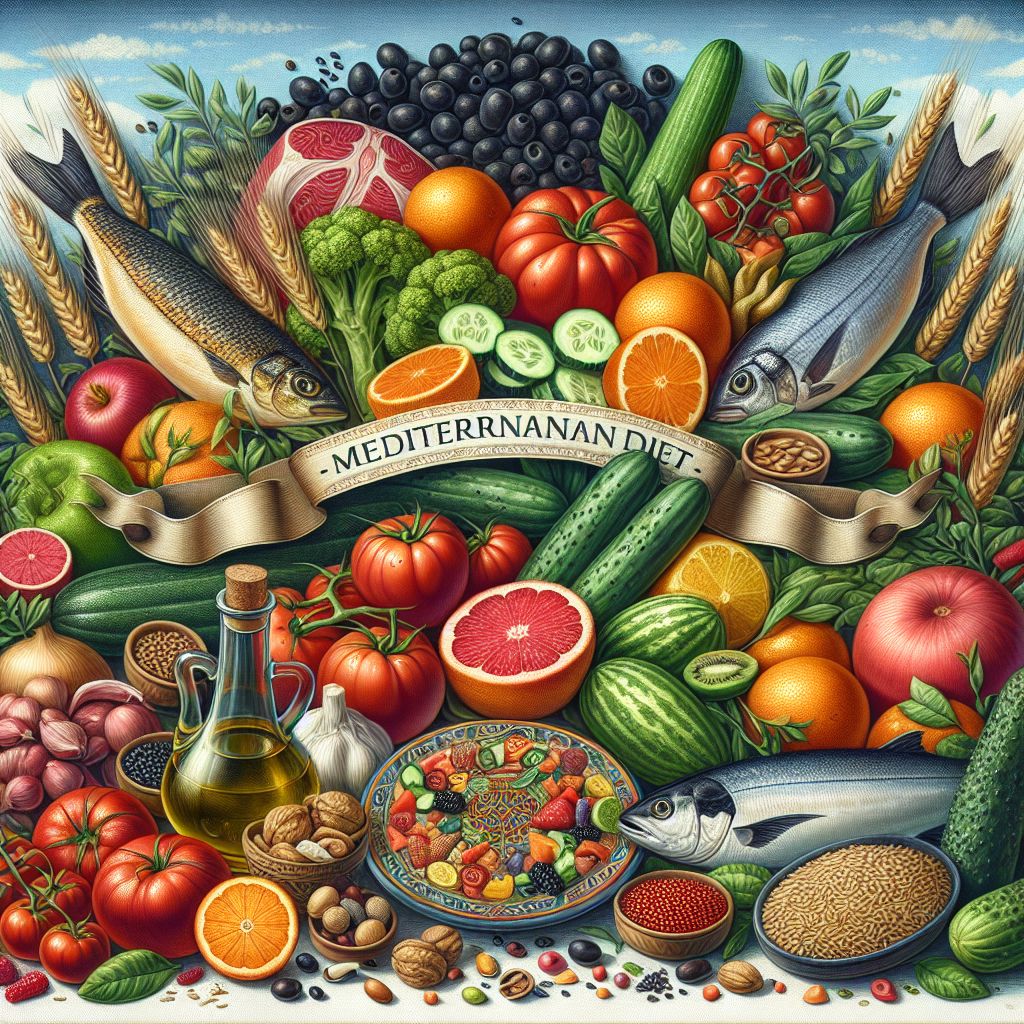
Mediterranean Diet Meal Plan: Ultimate Guide & Selected Supplements
Transforming your diet isn’t just about changing what’s on your plate; it’s about reshaping your relationship with food to embrace a healthier, happier lifestyle. And there’s no better way to do that than with the Mediterranean diet – a delicious, heart-healthy approach that’s as rich in culture as it is in flavors.
Article-at-a-Glance
-
The Mediterranean diet is a plant-forward eating style that emphasizes fruits, vegetables, whole grains, and healthy fats.
-
It includes moderate portions of dairy, fish, and poultry, with limited intake of red meat and sweets.
-
Studies show that this diet can lead to weight loss, improved heart health, and a reduced risk of chronic diseases.
-
Creating a Mediterranean meal plan involves stocking up on essential ingredients and preparing simple, flavorful dishes.
-
Selected supplements can complement the diet to ensure you’re getting all the nutrients you need.
Embark on a Mediterranean Diet Journey
Imagine sitting by the sea, the sun warming your face, as you enjoy a plate full of vibrant colors and mouth-watering flavors. That’s the essence of the Mediterranean diet – a way of eating that can turn every meal into a small celebration of life. But it’s not just about pleasure. This diet is backed by science as one of the healthiest ways to eat, and it’s a sustainable choice you can stick with for the long haul.
What Defines the Mediterranean Diet?
At its core, the Mediterranean diet is about more than just food. It’s a holistic approach to eating that’s steeped in the traditions of the countries bordering the Mediterranean Sea. What sets it apart is its emphasis on whole, minimally processed foods. It’s rich in:
-
Fruits and vegetables
-
Whole grains
-
Legumes
-
Nuts and seeds
-
Lean proteins, especially fish
-
Plenty of extra virgin olive oil
And let’s not forget the social aspect – meals are often enjoyed in the company of family and friends, making eating a shared, joyous event.
Quick Snapshot of a Mediterranean Meal Plan
So, what does a day on the Mediterranean diet look like? Here’s a taste: For a more detailed approach, check out this step-by-step guide to the Smoothie Diet.
-
Breakfast: Greek yogurt with honey, nuts, and fresh berries.
-
Lunch: A hearty chickpea salad with a variety of colorful veggies, dressed in olive oil and lemon.
-
Dinner: Grilled fish with a side of roasted vegetables and quinoa.
-
Snacks: Hummus with sliced cucumbers and whole-grain pita.
Each meal is balanced, vibrant, and full of flavors that celebrate the natural taste of each ingredient.

The Foundation of Your Mediterranean Diet
Building your Mediterranean diet starts with understanding the key components that make up its foundation. Let’s dive into each one and explore why they’re so important for your health.
Fruits and Vegetables: A Rainbow on Your Plate
Why settle for a bland meal when you can have a plate full of colors? Fruits and vegetables are at the heart of the Mediterranean diet. They’re not only packed with vitamins and minerals but also contain phytonutrients that offer a range of health benefits. Aim for at least five servings a day to keep your meals vibrant and nutritious.
Examples include:
Tomatoes, brimming with lycopene; leafy greens like spinach, which are high in iron and calcium; and berries, loaded with antioxidants that fight inflammation.
And remember, the more colors on your plate, the wider the range of nutrients you’re getting.
Whole Grains: The Power of Fiber
Whole grains are a staple in the Mediterranean diet, providing essential nutrients and keeping you full longer. They’re a great source of fiber, which can help maintain a healthy digestive system and lower cholesterol levels. Include options like:
-
Whole wheat bread
-
Brown rice
-
Barley
-
Oats
These grains can be the base of a meal, a side dish, or even part of a snack.
Healthy Fats: The Olive Oil Essentials
One of the diet’s cornerstones is its focus on healthy fats, particularly olive oil. Rich in monounsaturated fats, it’s not just good for your heart; it also brings out the flavors of other ingredients. Use it for cooking, as a salad dressing, or even as a dip for whole-grain bread.
Most importantly, replacing saturated fats with healthier options like olive oil can have a significant impact on your overall health.
Protein Choices: Seafood, Legumes, and Nuts
When it comes to protein, the Mediterranean diet offers a variety of choices. Seafood is a favored option, eaten at least twice a week. It’s a great source of omega-3 fatty acids, which are crucial for heart and brain health. Legumes like beans, lentils, and chickpeas, as well as nuts and seeds, are other protein-rich foods that fit perfectly into this diet.
-
Fish like salmon and mackerel
-
Chickpeas for homemade hummus
-
Lentils for soups and salads
-
Almonds and walnuts for snacking
These foods not only provide protein but also contribute fiber and a range of other nutrients. Discover the benefits of omega oil supplements for a well-rounded diet.

Your 7-Day Mediterranean Meal Planner
Getting started with a Mediterranean diet is easier when you have a plan. Here’s a simple 7-day meal planner to help you dive right in. Feel free to mix and match meals to suit your taste – the key is variety and enjoying the natural flavors of each ingredient. For more guidance, take a look at our step-by-step approach to mastering the smoothie diet as a complement to your Mediterranean lifestyle.
Day 1:
-
Breakfast: Oatmeal topped with sliced almonds and fresh figs.
-
Lunch: Quinoa salad with cherry tomatoes, cucumber, feta cheese, and a drizzle of olive oil.
-
Dinner: Baked cod with a side of roasted Mediterranean vegetables.
Day 2:
-
Breakfast: Whole grain toast with avocado and poached eggs.
-
Lunch: Lentil soup with a side of whole-grain pita bread.
-
Dinner: Grilled chicken skewers with bell peppers and onions, served with a side of tabbouleh.
Day 3:
-
Breakfast: Greek yogurt with honey and walnuts.
-
Lunch: Tuna salad stuffed in a whole wheat pita with lettuce and tomato.
-
Dinner: Eggplant parmesan with a fresh green salad.
Day 4:
-
Breakfast: A smoothie made with spinach, banana, and almond milk.
-
Lunch: Farro salad with roasted beets, goat cheese, and a sprinkle of dill.
-
Dinner: Shrimp sautéed with garlic, served over a bed of whole wheat pasta and fresh parsley.
Day 5:
-
Breakfast: Scrambled eggs with diced tomatoes, onions, and spinach.
-
Lunch: Hummus and vegetable wrap with a side of olives.
-
Dinner: Stuffed peppers with ground turkey, rice, and a mix of herbs.
Day 6:
-
Breakfast: A bowl of fresh fruit with a dollop of Greek yogurt.
-
Lunch: Chickpea and vegetable stew.
-
Dinner: Grilled lamb chops with rosemary, served with sautéed kale and garlic.
Day 7:
-
Breakfast: Chia seed pudding made with almond milk and topped with berries.
-
Lunch: Arugula salad with grilled peaches, pecans, and a balsamic reduction.
-
Dinner: Pan-seared salmon with a side of roasted brussel sprouts and quinoa.
These meals are just a starting point. The beauty of the Mediterranean diet is its flexibility and focus on whole, fresh foods.
Recipes for Success: Simple and Delicious Options
One of the joys of the Mediterranean diet is the simplicity of the recipes. Here are a couple of examples to get you started:
Chickpea Salad: Combine canned chickpeas (rinsed and drained), chopped cucumbers, red onions, cherry tomatoes, and parsley. Dress with olive oil, lemon juice, salt, and pepper. It’s refreshing, filling, and takes minutes to prepare. For more healthy meal ideas, check out our guide.
Garlic Lemon Shrimp: Sauté shrimp in olive oil with minced garlic until pink. Add a splash of white wine and let it reduce slightly before squeezing fresh lemon juice over the top. Finish with chopped parsley and serve over whole-grain pasta or zucchini noodles.
These recipes showcase the diet’s reliance on simple, fresh ingredients that come together to create flavorful and nutritious meals.
Meal Prepping Tips: Save Time and Savor Flavors
Meal prepping is your secret weapon for sticking to a Mediterranean diet. It saves time, reduces stress, and ensures you always have healthy options on hand. Here are some tips to get you started:
-
Roast a large tray of Mediterranean vegetables at the beginning of the week to add to salads, pastas, or as a side dish.
-
Cook a batch of whole grains like quinoa or farro to use as a base for meals throughout the week.
-
Prepare a big pot of legumes such as lentils or chickpeas to add protein to your dishes.
-
Make your own dressings using olive oil, lemon juice, and your favorite herbs for a quick flavor boost.
With these prepped ingredients, you can assemble meals in no time. This approach not only keeps you on track with healthy eating but also lets you enjoy the process of creating and savoring your food. For more tips on maintaining a healthy lifestyle, check out our guide on intermittent fasting methods and benefits.
Add-ons for Optimal Health: Supplements and Alternatives
While the Mediterranean diet is rich in nutrients, there are times when you might need an extra boost. Here’s where supplements can play a role, especially if you have specific dietary restrictions or needs.
When Nature Needs a Boost: Vitamins and Minerals
Even with a balanced diet, some people may require additional nutrients. Here’s a quick look at supplements that can support your Mediterranean lifestyle: consider incorporating best omega oil supplements for their weight loss and anti-inflammatory benefits.
-
Vitamin D, for those with limited sun exposure, to support bone health.
-
Omega-3 fatty acids, if fish isn’t a regular part of your diet, to maintain heart health.
-
Calcium, for those who don’t consume dairy, to prevent bone density loss.
Always consult with a healthcare provider before adding supplements to your diet to ensure they’re right for you.
Selected Supplements to Complement Your Diet Plan
There are many supplements on the market, but it’s important to choose wisely. Look for those that align with the principles of the Mediterranean diet, such as:
-
High-quality fish oil for omega-3s
-
Plant-based protein powders for an extra protein boost
-
Probiotics to support gut health
Remember, supplements should complement, not replace, the nutritious foods you’re eating. They’re there to fill gaps, not to serve as the foundation of your diet. For more insight, read about the effectiveness of weight loss supplements.
Alternatives for Special Dietary Needs
The Mediterranean diet is inherently flexible, making it suitable for many dietary needs. For those who are vegetarian, vegan, or have allergies, here are some alternatives:
-
Use legumes and tofu as protein sources instead of fish and poultry.
-
Opt for dairy-free yogurt and milk alternatives if you’re vegan or lactose intolerant.
-
Explore gluten-free grains like buckwheat or millet if you’re avoiding gluten.
With a little creativity, you can tailor the Mediterranean diet to fit your unique requirements while still enjoying all its benefits.
Mindfulness and Eating: The Mediterranean Way
Eating is not just about filling our bellies. It’s about nourishing our bodies and souls. That’s why mindfulness is such a key ingredient in the Mediterranean diet. It’s about being present with your food, savoring each bite, and listening to your body’s hunger and fullness cues. This approach can transform your meals from mindless munching to a source of joy and satisfaction.
Eating Out: Mediterranean Choices on the Menu
Even when dining out, you can stick to your Mediterranean meal plan. Look for dishes that are rich in vegetables, grains, and lean proteins. Opt for grilled or baked options instead of fried, and ask for dressings and sauces on the side. Many restaurants now offer Mediterranean-inspired dishes that are both delicious and nutritious.

Maximizing the Benefits: Exercise and Lifestyle Factors
Adopting the Mediterranean diet is just one part of a healthier lifestyle. Exercise is another crucial component. Regular physical activity, such as walking, swimming, or yoga, complements the diet’s benefits by improving cardiovascular health, boosting mood, and managing weight.
Physical Activity: A Key Component of the Mediterranean Lifestyle
The Mediterranean lifestyle isn’t sedentary. It involves moving your body regularly, whether that’s through daily walks, gardening, or even dancing. The key is to find activities you enjoy and make them a part of your routine. This way, exercise doesn’t feel like a chore but rather a natural part of your day.
Rest and Relaxation: Recharge the Mediterranean Way
Rest is just as important as activity. The Mediterranean lifestyle values relaxation and stress reduction. Take time for yourself to unwind, whether that’s through meditation, a leisurely stroll, or simply sitting down with a good book. This balance is essential for overall well-being.
Frequently Asked Questions
Is the Mediterranean Diet Suitable for Everyone?
Absolutely! The Mediterranean diet is adaptable to various tastes and dietary needs. It’s rich in fruits, vegetables, and whole grains, making it suitable for vegetarians and vegans. For those with allergies or intolerances, there are plenty of alternative ingredients to keep meals safe and delicious.
How Can I Adapt the Mediterranean Diet if I’m a Vegetarian?
Vegetarians can thrive on the Mediterranean diet. Replace meat with plant-based proteins like lentils, beans, and tofu. Dairy can also be swapped for plant-based alternatives, and there are countless vegetable-based dishes that are both traditional and satisfying.
Can the Mediterranean Diet Help with Weight Loss?
Yes, the Mediterranean diet can be an effective way to lose weight and maintain it. It’s high in fiber, which can help you feel full, and it emphasizes whole foods over processed items, which typically contain more calories and less nutrition.
What Are Some Quick Mediterranean Snacks?
Snacking can be healthy and tasty with Mediterranean options. Try a small handful of nuts, a piece of fruit, or a slice of whole-grain bread with a bit of cheese. These snacks are not only delicious but also keep you satisfied until your next meal.
How Do I Incorporate More Seafood into My Diet?
Start by adding seafood to your meals twice a week. Choose fatty fish like salmon or mackerel for a dose of omega-3s, and try different cooking methods, such as grilling, baking, or poaching, to keep things interesting. Seafood can also be added to salads, pastas, and stews for variety.
In conclusion, embracing the Mediterranean diet is about more than just changing your eating habits; it’s about adopting a lifestyle that celebrates food, encourages physical activity, and values rest and relaxation. With its delicious flavors, health benefits, and adaptability, the Mediterranean diet is an excellent choice for anyone looking to transform their diet and improve their overall well-being. So why not start your Mediterranean journey today and experience the vibrant tastes and healthy living it offers?

Hi, I’m David, the founder of Semaglutide Group and a passionate advocate for busy moms looking to reclaim their health and well-being. I understand the challenges that come with balancing family responsibilities while trying to maintain a healthy lifestyle. My knowledge of semaglutide has been impactful, and now I’m on a mission to share this knowledge with other moms who are eager to find a sustainable path to weight loss.
3 thoughts on “Mediterranean Diet Meal Plan: Ultimate Guide & Selected Supplements”
Leave a Reply
You must be logged in to post a comment.

[…] sleep is like gold for your leptin levels. It’s during those restful hours that your body works to balance hormones, including leptin. A lack of sleep can mess with this […]
[…] Probiotics are the beneficial bacteria that your gut requires to work properly. They aid in the regulation of your digestive system, which is essential during a cleanse. Probiotics can be found in fermented foods such as yogurt, kefir, and sauerkraut, or you can choose a top-quality supplement. […]
[…] lot of perks for your gut microbiome, such as increased diversity and improved performance of your gut bacteria. When you pair this with a diet high in prebiotics and probiotics, you set up a strong combination […]